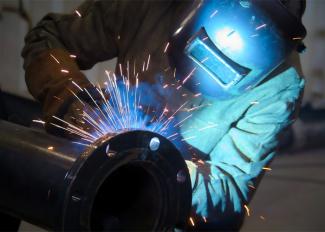NETL and the Appalachian Regional Commission (ARC) have announced five finalists for the Advanced Welding Workforce Initiative (AWWI), a partnership to invest approximately $1 million in education and training for advanced technical workers in Appalachia.
The U.S. Department of Energy (DOE) Office of Fossil Energy High Performance Materials Program provided $750,000 to AWWI to prepare a new generation of welders to manufacture and service high-temperature alloy components in advanced coal- and natural gas-fueled electric generating stations. Such plants operate at significantly higher temperatures and pressures, which increases efficiency and lowers emissions of carbon dioxide and requires the use of superalloys that can withstand the harsh conditions.
Skills to be acquired through AWWI training will also be broadly applicable for positions in Appalachia’s emerging aerospace, aviation, automotive and petrochemical industries, which will require welders and other technicians with expertise in working with high-performance materials.
Finalists were selected on the basis of connecting proposals with pressing regional needs, including expanding offerings into economically distressed areas, targeting designated Opportunity Zones and recruiting workers in long-term recovery from substance use disorder.
The five finalists are:
- Robert C. Byrd Institute Advanced Welding Program at Marshall University in Huntington, West Virginia, which will offer education and hands-on, mobile training for Central Appalachia’s advanced welders to prepare them for opportunities in manufacturing, fossil power plant, aviation, automotive and petrochemical industries.
- Southeast Community and Technical College Harlan Welding Expansion in Harlan, Kentucky, which will update equipment and scholarship offerings for an existing welding program serving three economically distressed counties, that also include designated Opportunity Zones.
- Westmoreland County Community College Advanced/Special Alloy Welding Program in Youngwood, Pennsylvania, which will expand training and certifications in existing welding programs to include the joining of advanced alloys for high-temperature fossil-based power plants, as well as aviation, automotive and petrochemical industries.
- Calhoun Community College Robotic Welding Program in Decatur, Alabama, which will expand course offerings to include robotic welding for students and incumbent workers seeking careers in North Alabama’s growing aerospace and defense-related manufacturing industries.
- Belmont College Eastern Ohio Appalachia Pipe Welding and Fabrication Project in St. Clairsville, Ohio, which will equip advanced welders with specialized skills for the oil and gas and metal fabrication industries, a sector that will soon need hundreds of qualified workers for a proposed ethane cracker plant in Belmont County.
ARC and DOE expect to issue AWWI award announcements by this spring.
“The development and use of advanced high-performance materials are crucial to operating low- and near-zero emission plants powered by Appalachia’s abundant reserves of coal and gas,” said Mike Knaggs, Associate Director, Research Partnerships and Technology Transfer, NETL.
“With this announcement, NETL is demonstrating its commitment to partner with other government agencies to generate clean, abundant and affordable energy while helping workers learn valuable skills for employment in energy and in emerging industries,” Knaggs said.
“Over the last 20-plus years, NETL and its partners have led the development of advanced alloys and power plant designs to enable fossil-based power plants to be cleaner, more reliable and more cost-effective,” said Briggs White, Technology Manager, High Performance Materials, NETL. “As these technologies are commercialized, it is imperative to enable the workforce with the necessary skills to support manufacture and service of these advanced materials and power plants.”
“The plentiful energy resources being extracted in the Appalachian Region are yielding a value chain that can create thousands of well-paid, high-skill jobs for Appalachian workers, including in advanced manufacturing techniques,” said ARC Federal Co-Chairman Tim Thomas. “Among these are good jobs in advanced welding, and that is why ARC is partnering with the National Energy Technology Laboratory to invest in programs ensuring our workforce is prepared for this unique opportunity.”
Other collaborations between the agencies include the Appalachian Energy and Petrochemical Renaissance: An Examination of Economic Progress and Opportunity, a DOE report, which included ARC research, that found petrochemical manufacturing currently in development in Appalachia is projected to attract between $16 billion and $20 billion in capital investment, and create more than 9,800 jobs directly and indirectly in Appalachia by 2025.
The U.S. Department of Energy’s National Energy Technology Laboratory develops and commercializes advanced technologies that provide reliable and affordable solutions to America’s energy challenges. NETL’s work supports DOE’s mission to advance the national, economic and energy security of the United States.
The Appalachian Regional Commission (www.arc.gov) is an economic development agency of the federal government and 13 state governments focusing on 420 counties across the Appalachian Region. ARC’s mission is to innovate, partner and invest to build community capacity and strengthen economic growth in Appalachia to help the region achieve socioeconomic parity with the nation.




